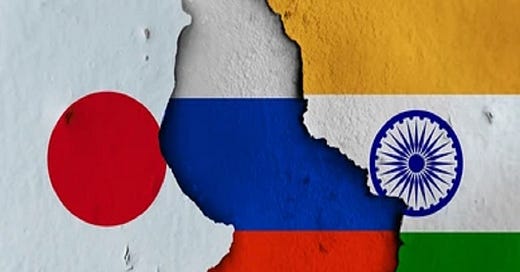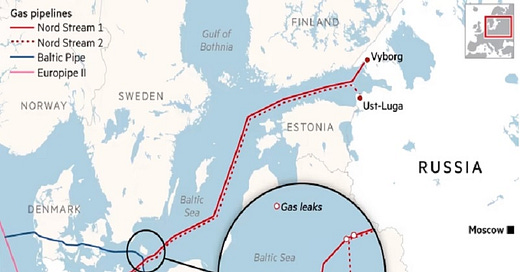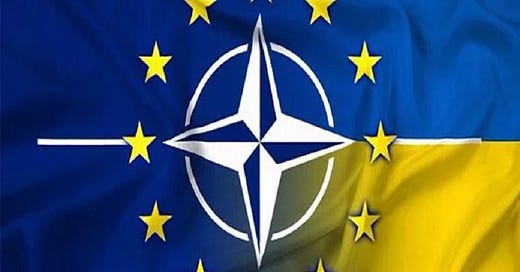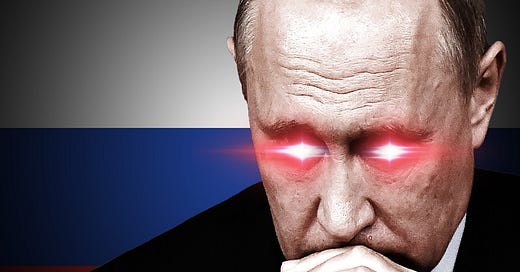
India might conclude that Japan was put up to this by its American patron if it comes to pass, which could then complicate their multilateral efforts to manage China’s rise.
Tribune India cited Japanese media to report that Chief Cabinet Secretary Yoshimasa Hayashi recently said that “At the recent G-7 summit, we have announced that we are considering a new package of sanctions that will include companies from third countries. We are looking at measures against companies from China, India, the UAE and Uzbekistan.” The Economic Times confirmed this report in their article citing unnamed sources who are allegedly familiar with the situation.
It would be a bad idea for Japan to sanction Indian companies on anti-Russian pretexts since that would toxify their strategic ties. India and Japan cooperate in the Quad, which is nowadays mostly just a talking club unlike former Russian Defense Minister Sergey Shoigu’s claim that it’s a US-controlled anti-Chinese proxy group, and are also close economic partners. Their hard-earned mutual trust that was built in the years after Japan sanctioned India in 1998 for its nuclear tests would be instantly shattered.
The consequences of that happening could complicate the US’ grand strategic plans in Asia, which are partially predicated upon the comprehensive strengthening of Indo-Japanese relations. India’s problems with China are independent of the US’ or Japan’s, but it finds common cause with them in managing that country’s rise. Nevertheless, the newfound trouble in its ties with the US coupled with the scenario of Japan sanctioning its companies could impede their multilateral cooperation in this respect.
India might also conclude that Japan was put up to this by its American patron as part of the latter’s plans to pile more pressure upon it for the reasons that were explained in the preceding hyperlinked analysis, which can be summarized as punishing it for refusing to dump Russia. After all, the US could always intervene behind the scenes to stop Japan if it was really concerned about the consequences that these sanctions could have on their cooperation with India vis-à-vis China, but it might not do so.
In that event, American policymakers would have calculated that it’s more important to punish India than to continue working with it in furtherance of their common cause, which would in turn suggest that more pressure might then be applied against it in the future on anti-Russian or other pretexts. The US’ liberal-globalist faction interpreted the latest general elections in India as weakening Prime Minister Narendra Modi so it’s possible that they’re emboldened by that to ramp up their pressure against him.
Instead of doing so directly, they might have decided to first act through Japan via the means of having that country sanction its companies for doing business with Russia, after which it can’t be ruled out that other G7 states such as the US itself might then follow its lead as part of a preplanned policy. To be clear, that also might not happen at all, with or without Japan doing what Hayashi just announced. Even so, however, it’s credible enough of a possibility for India to think about just in case.
Delhi would have to respond if this sequence of events unfolds, though it might only take the form of harsh denouncements as opposed to any meaningful response owing to India’s complex economic interdependence with the G7, which also serves to limit the extent of the bloc’s potential sanctions too. In any case, bilateral trust would be broken, and India might defiantly double down even further on its relations with Russia in order to send the message that it won’t be deterred by such pressure.
















Japan handelt im Auftrag der Weltmacht USA, Japan ist seit ende des II. Weltkrieg ein Protektorat der USA ohne Friedensvertrag und ohne Verfassung!!!
The most important assets for Japan as a nation are its people and its culture. Large scale fast immigration destroys both, with significant impact within one generation. What Japan does not have are raw natural resources, especially energy. Japan's prosperity depends on a detente with Russia for resource, and good relationship with mostly everybody for business relationship. The relation between China and Japan will likely remain in tension for foreseeable future, due more to the Chinese side national memory. If Japan is forced to sanction somebody, it is China, not Russia or India. India alone can single-handedly cut off oil supply to Japan from ME. Geography dictates that Japan must have close affinity with Eurasia, at least closer than a puppet master 10,000 km away. Unless, of course, if Japan wants to restart an imperial career. Abe's diplomatic policies are better for Japan, a lot better than Kishida's.